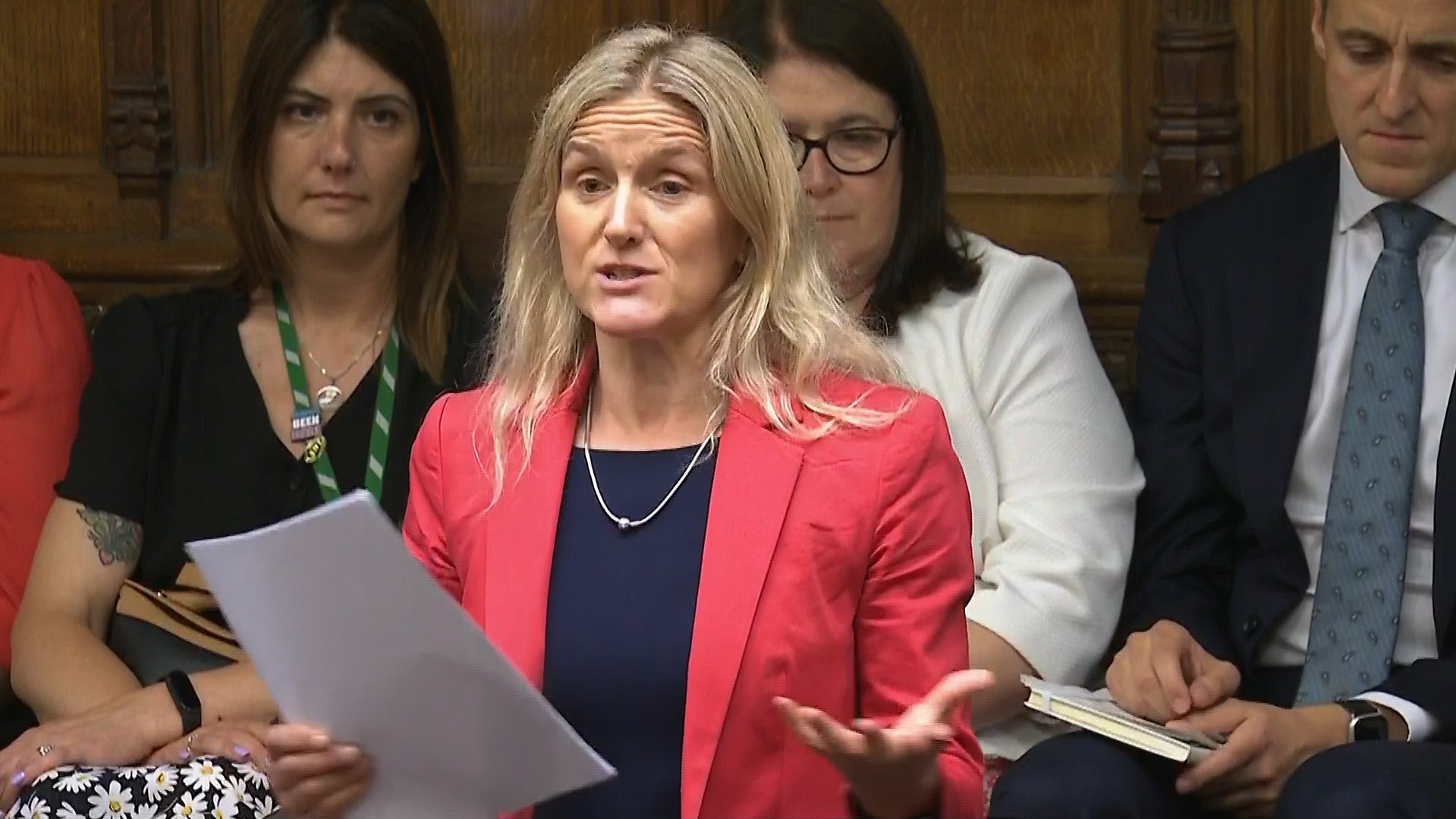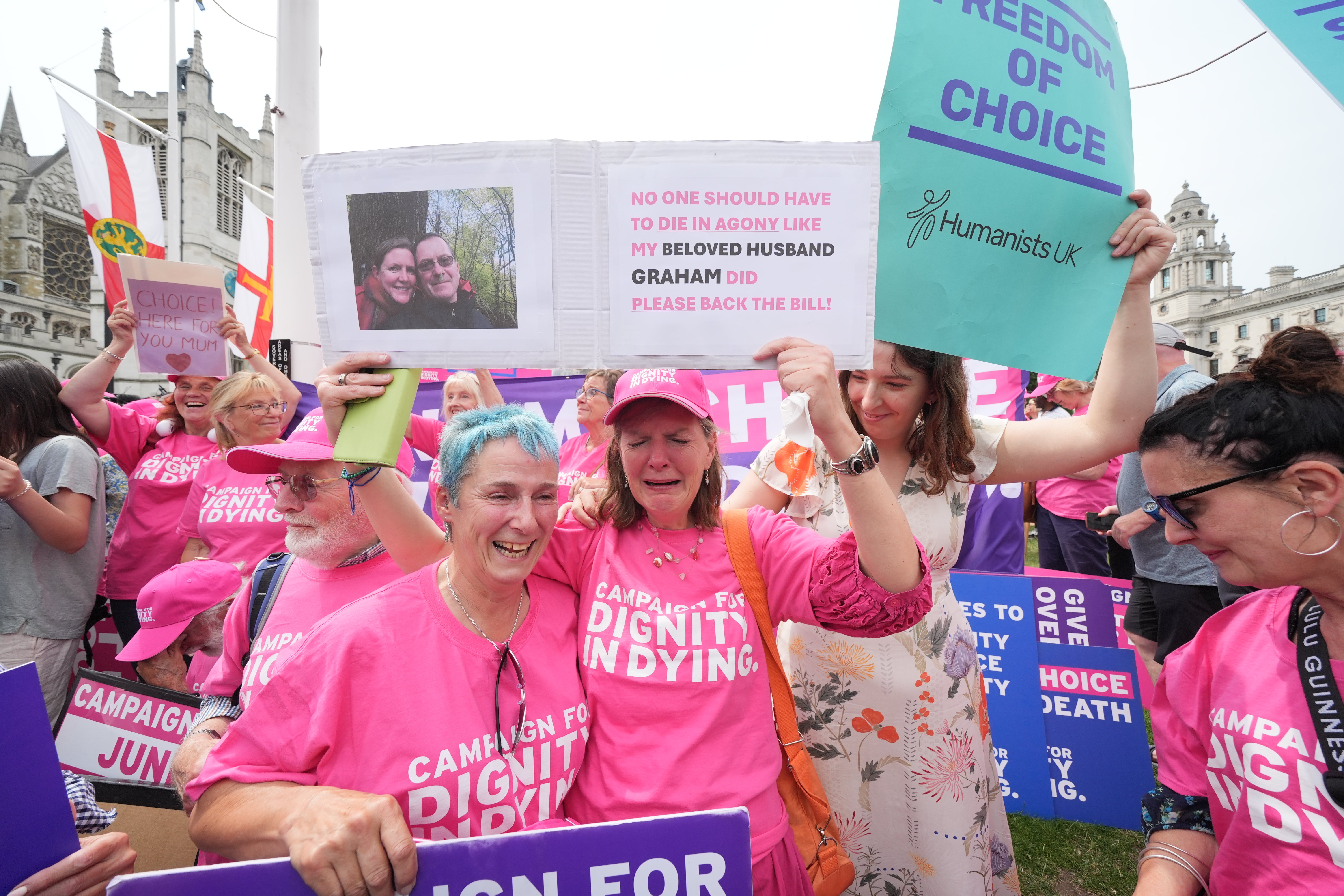Assisted dying is one step closer to becoming law after a historic vote in the House of Commons paved the way for one of the biggest changes to social policy since abortion was legalised in 1967.
Following an emotional debate, MPs passed Kim Leadbeater’s bill by 314 to 291 votes – a majority of just 23 – to legalise the procedure for people with terminal illnesses.
The legislation would allow terminally ill adults in England and Wales who have fewer than six months to live to apply for an assisted death, subject to approval by two doctors and a panel including a social worker, a senior legal figure and a psychiatrist.
Supporters of the assisted dying bill wept and hugged one another outside parliament as news broke that MPs had passed the legislation.
The bill will now go to the House of Lords for further scrutiny, where it is set to face more opposition.
The vote came after months of impassioned debate, culminating in a tense third reading debate on Friday.
Ms Leadbeater described the passing of the assisted dying bill at third reading as a “result that so many people need”.
The Spen Valley MP added: “When you’ve spent as much time as I have with people who have got experience of losing loved ones in very difficult circumstances, and you’ve spent time with terminally ill people who are just asking for choice at the end of their days, then this is absolutely the right thing to do.”
Among the MPs who backed the bill were prime minister Sir Keir Starmer and his predecessor Rishi Sunak. Tory leader Kemi Badenoch, health secretary Wes Streeting and deputy prime minister Angela Rayner, meanwhile, voted against.

Supporters of the bill hailed the historic vote and expressed their relief that assisted dying is now likely to become available by the next election. In an interview with ITV News, Dame Esther Rantzen, a celebrity backer of the bill who has stage-four lung cancer, said: “It’s really important it becomes law so dying people in the future will have confidence knowing they can ask for a quick, pain-free death.
“It won’t come in my lifetime, I won’t live long enough, but I am so relieved it will help future generations to look forward to a good death. I am astonished I have lived to see the moment.”
Andrew Copson, chief executive of Humanists UK, said: “The House of Commons has taken a historic step towards meeting the aspirations of the public, who overwhelmingly support having choice, dignity and compassion at the end of their lives. We welcome this and now look forward to working with the Lords on the legislation.”
Carmen Sumadiwiria, director of My Death, My Decision, said: “After months of scrutiny and careful debate, this bill now includes stronger safeguards and clearer protections.”
But even after the vote, opponents were questioning the moral authority of the result given that less than half of eligible MPs backed the bill.
Former Ministry of Justice adviser Rajiv Shah said: “The Terminally Ill Adults Bill has lost its absolute majority in the Commons (they got 314, and it’s 318 for an absolute majority), and their lead has been cut by more than half. Not a bad result. The fight continues.”
James Sanderson, chief executive of the palliative care and bereavement charity Sue Ryder, said his organisation was “concerned that gaps in care could be leaving some people feeling it’s their only option”.
“Our research found that 77 per cent of people felt that terminally ill people could be forced to consider an assisted death because the end-of-life care they need isn’t available. That must change – no matter how the bill progresses in its next stages through the House of Lords.”
Dr Gordon Macdonald, chief executive of Care Not Killing, said: “This is a deeply flawed and dangerous bill that, since November, has been made considerably worse, with important safeguards watered down or scrapped.”
The debate saw tears from MPs and passionate arguments from both sides as parties split on the issue.
Opening the debate, Ms Leadbeater told the Commons that the assisted dying bill “is not a choice between living and dying – it is a choice for terminally ill people about how they die”.
The Labour MP said that, if the bill is not passed, “It means we will have many more years of heartbreaking stories from terminally ill people and their families, of pain and trauma, suicide attempts, PTSD, lonely trips to Switzerland, police investigations and everything else we have all heard over recent months.”
Making the opening speech for the opponents of the bill, former minister Sir James Cleverly urged MPs not to “subcontract” scrutiny of the bill to peers.

Referring to the future passage of this bill, if it clears the Commons, Sir James told MPs: “We were told at second reading that a lot of the concerns, a lot of the worries, a lot of the detailed questions would be resolved through the committee process. We were promised the gold standard, a judicially underpinned set of protections and safeguards.
“Those protections did not make it through committee.
“And I’ve also heard where people are saying, ‘Well, there are problems, there are still issues, there are still concerns I have’... Well, the Lords will have their work to do. But I don’t think it is right, and none of us should think that it is right to subcontract our job to the other place [the House of Lords].”
Why assisted dying could still be thwarted
Rantzen: MPs backing assisted dying Bill will protect people from ‘bad death’
Assisted dying law closer but MPs’ support narrows in historic vote
Why is Angela Rayner shifting the council tax burden from north to south?







